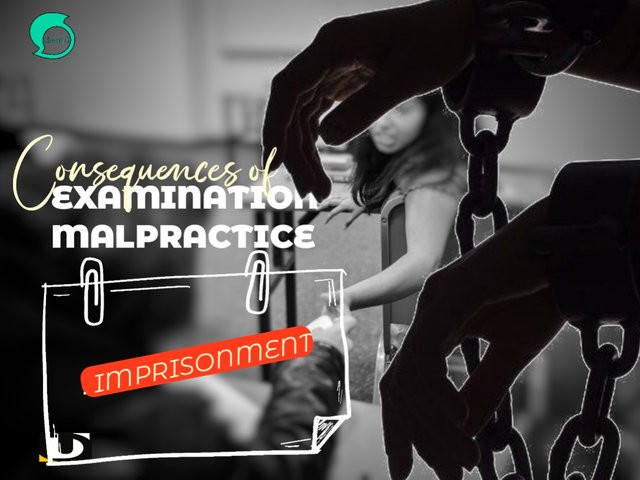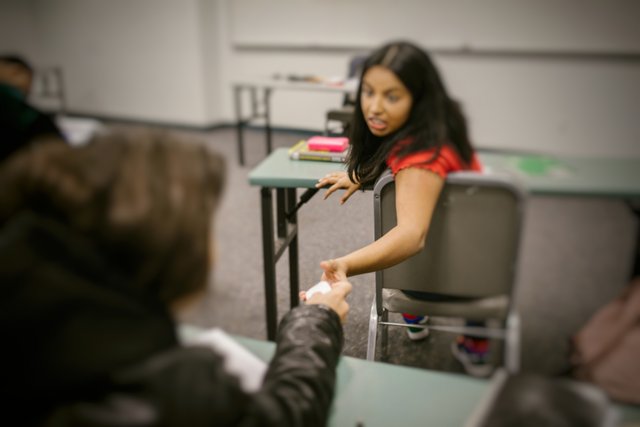Examination Malpractice
Introduction |
|---|
Sometimes in a bid to get things done the easier way, we often go through unconventional routes or shortcuts. This shortcuts may bring results quicker and faster but often time the results are flawed or there's always a problem at the end of the way. Many students
test and exams and feel the only way to pass or get their dream score is to go through an unconventional route - Examination Malpractice.
A seasoned teacher and student @nsijoro has brought this up as a contest. Join me as I analyse the concept of examination malpractice by following this contest guide questions:
What is examination malpractice? |
|---|
Examination malpractice is a purposeful act of deceit, commited by an examinee(a student or one writing the examination) to gain unjust advantage in an examination.
A look at the words that make up the phrase Examination Malpractice would help us understand even better the concept of examination malpractice.
Examination which is gotten from the word examine as related to the educational field is an action (it can be verbal, written or practical) taken to asses a student or learner in order to determine whether the goal, aims and objectives of what was intended(lessons/mentorship/learning/apprenticeship) has been achieved.
Malpractice gotten from the word mal and practice which means ill/wrong/unethical practices or actions.
Therefore examination malpractice are ill practices that hinders the goal of examination.
Does examination practice come with consequences? list them |
|---|
They are plethora of consequences that comes from examination malpractice and this consequences affect not just the culprit but the educational system and even the society at large. Some of these consequences include;
Consequences to a student
 imprisonment, one of the consequence of examination malpractice imprisonment, one of the consequence of examination malpractice |
|---|
Legal consequences such as fines and imprisonment if caught.
Lack of self esteem, as one isn't confident in his own ability but has to look out for external sources to aid him/her scale through his examinations.
Expulsion or suspension from the institution.
Examination malpractice breeds laziness and unwillingness to learn.
Consequences to the educational system:
Failure to achieve learning goals. This is so as examination was meant to test level of understanding. Examination malpractice renders this test useless at such determining if learning has actually taken place becomes close to impossible.
Loss of credibility: An institution known for cheating is like a community full of plagiarist, and as we all know such system will loose credibility.
Consequences to the society
- Mediocrity: When one doesn't know what he ought to know at a certain stage, and that hasn't been corrected because he/she passed an examination meant to test his knowledge on thay field, he/she grows with that ignorance and becomes a mediocre.
Ever engaged in Examination practice, or do you know someone (a student) who has |
|---|
As a teacher, I've met students who has indulged in the practice of examination malpractice. The consequences were terrible I must confess.
different ways people cheat in exams and the cause of this. |
|---|
Ways people carry out examalprctice
Many people resort to many means amusing and clever means to carry out examination malpractice. This includes ;
Sneaking in notes or materials and copying directly from them during the examination.
Writing the supposed answers on body parts or materials close by to use as a refrence during examinations.
Using unapproved gadgets and equipments.
exchanging answers with fellow candidates where it is not permitted.
paying for leaked questions, etc.
Why then do people/students involve in examination malpractice:
Fear of failure
Peer Pressure
Inability to understand the course or what is being taught.
Perception of a lesson as difficult
Improper Supervision
Laziness
Inability to study
Ways to curtail the increase in examination practice? |
|---|
Reorientation of Learners Mindset: Most students are severely allergic to failure, and feel that whatever could help them pass whether good or improper is worth doing. This the do irrespective of the fact that they don't understand the lesson at all. Students/learners should be taught to see failure in an examination as a drive to study harder and understand the vague concepts.
Revaluation of Teachers, Teaching methods and Teaching Materials: The Teacher, The technique employed to teach and the teaching materials used are three indispensable facilitators of understanding a concept. When one of this is flawed or missing, student struggle to grasp the concept taught and end up loosing track all together. And when examination comes there would find a need to externally support their brains(exam malpractice).
Rewarding and recognizing honesty and trustworthy examination conduct
Proper supervision.
Conclusion |
|---|
Though examination cannot be a true test of knowledge, it's still worth working hard for and helps a lot in identifying weak points. Therefore it should be carried out in all honesty and truthfulness.
@d-wings my fellow colleague, @bossj23 my mentor and my friend @fortwiz20; what do you think? I'd love to hear from you.
Thanks for reading through , hope you got informed;
I love y'all,
Adiós

Talking about examination malpractice, we have seen it in different schools. I must say that most time students do not participate in this act because they didn't read but sometimes if there's a tough question. Sometimes we commit this act because you don't really understand the subject and we're scared of failing. If you want to target the causes of examination malpractice, we'll realized that some of the causes are actually from the government. For my opinion I think if there's adequate materials and tools in place,it will help to minimize the senseless act. Thank you @uduak3287 for sharing.
0.00 SBD,
0.02 STEEM,
0.02 SP
I would say if you are afraid to fail then you will fail to know, it is by failing that we know where our mistakes is from, we buckle up and then put more effort
Strongly disagree, failing as a result of our mistakes we make is different from participating in malpractice all in the name of I don't want to lose. You can see that in most cases those who participate in the practice are being caught and punished and even worse than the fear of falling they were afraid of. Like I said people who engage in examination malpractice do it with mindset of passing the exam with flying color.failing is not a setback
#steemexclusive
@ myteacher
no
no
thank you for sharing your opinion on cheating during exams, it would be great if you could add some photos of your own.
Do you know that some students hate their teachers or dislike them? This also leads to exams malpractice as they dint be listening at all when the teacher us teaching.